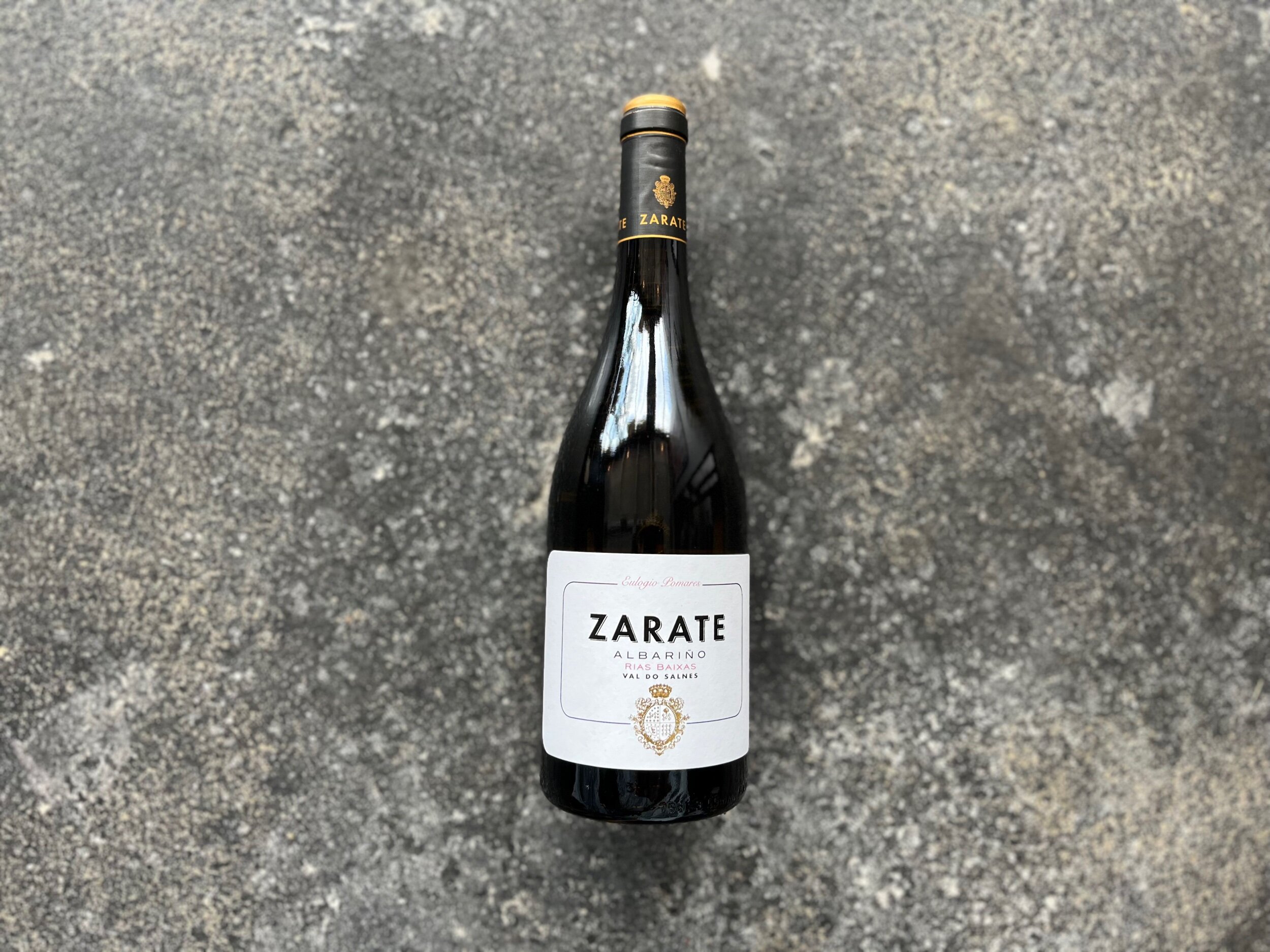 Image 1 of 1
Image 1 of 1


Zarate Albariño 2024
Location: Spain, Rías Baixas
Winemaker: Eulogio Pomares
Grapes: Albariño
From the Importer Rare Wine Co.:
In the years since then, Rías Baixas has exploded and is now home to six times as many producers. Its growth has been driven by the worldwide thirst for the bracingly fresh and aromatic white wines made from the region’s signature grape, Albariño. Most producers are content with making refreshing wines—for drinking young—to meet that demand. Yet, there are growers with much higher aspirations, and none more so than the one that pioneered high-quality Albariño in the mid-20th century: Bodegas Zarate.
It was in 1953 that Ernesto Zárate initiated the Albariño Festival in Salnés’ capital of Cambados. Yet, he withdrew his wine from the festival’s competition three years later having won first prize each year, vowing not to re-enter until another grower had matched his accomplishment. To this day, no one has.
Today, it is seventh-generation Eulogio Pomares at the helm of this ancient bodega, and he is even more quality-driven than his predecessors. As he told Food & Wine’s Ray Isle, “the problem with Albariño is that the message has been 'drink young, drink young, drink early, drink young' for the last 20 years. But the best thing with Albariño is to make wines that last."
Through an estate blessed with old vines, great terroirs, and his own perfectionist approach, Pomares does just that, making Albariños that are not only the best white wines of Galicia, but potentially in all of Spain. Yet, Eulogio’s brilliance isn’t limited solely to Albariño; he also makes fine reds from the native Espadeiro, Caiño Tinto and Loureiro Tinto varieties. Not only do they rank with Galicia’s finest, but they also honor the tintos that—prior to the phylloxera devastation of the 1890s—dominated viticulture in his locale, the Val do Salnés, in the heart of Rías Baixas.
The Zarate estate is an old one, founded in 1707, in the classic Val do Salnés zone. Formed by the lower reaches of the Umia River, its undulating slopes of Xabre—weathered granite—soil, and cool climate make Val do Salnés the region’s greatest terroir and home to its longest-lived wines. As remarkable as the high quality and originality of Eulogio’s wines are, the most extraordinary aspect to his approach is his use of natural viticulture, a seemingly impossible feat in what is Spain’s coolest and wettest winegrowing region. In fact, Pomares’ farming is almost fully biodynamic—he works the soil manually, uses cover crops for genetic diversity and makes his own biodynamic teas for vine and soil treatments. All new plantings are massale selections from the estate’s oldest vines. In the cellar, the Zarate Albariños are fermented with native yeasts and aged sur lie. Eulogio usually adds no sulfur during élévage, and at bottling he adds only a tiny amount as required for each wine’s stability.
Location: Spain, Rías Baixas
Winemaker: Eulogio Pomares
Grapes: Albariño
From the Importer Rare Wine Co.:
In the years since then, Rías Baixas has exploded and is now home to six times as many producers. Its growth has been driven by the worldwide thirst for the bracingly fresh and aromatic white wines made from the region’s signature grape, Albariño. Most producers are content with making refreshing wines—for drinking young—to meet that demand. Yet, there are growers with much higher aspirations, and none more so than the one that pioneered high-quality Albariño in the mid-20th century: Bodegas Zarate.
It was in 1953 that Ernesto Zárate initiated the Albariño Festival in Salnés’ capital of Cambados. Yet, he withdrew his wine from the festival’s competition three years later having won first prize each year, vowing not to re-enter until another grower had matched his accomplishment. To this day, no one has.
Today, it is seventh-generation Eulogio Pomares at the helm of this ancient bodega, and he is even more quality-driven than his predecessors. As he told Food & Wine’s Ray Isle, “the problem with Albariño is that the message has been 'drink young, drink young, drink early, drink young' for the last 20 years. But the best thing with Albariño is to make wines that last."
Through an estate blessed with old vines, great terroirs, and his own perfectionist approach, Pomares does just that, making Albariños that are not only the best white wines of Galicia, but potentially in all of Spain. Yet, Eulogio’s brilliance isn’t limited solely to Albariño; he also makes fine reds from the native Espadeiro, Caiño Tinto and Loureiro Tinto varieties. Not only do they rank with Galicia’s finest, but they also honor the tintos that—prior to the phylloxera devastation of the 1890s—dominated viticulture in his locale, the Val do Salnés, in the heart of Rías Baixas.
The Zarate estate is an old one, founded in 1707, in the classic Val do Salnés zone. Formed by the lower reaches of the Umia River, its undulating slopes of Xabre—weathered granite—soil, and cool climate make Val do Salnés the region’s greatest terroir and home to its longest-lived wines. As remarkable as the high quality and originality of Eulogio’s wines are, the most extraordinary aspect to his approach is his use of natural viticulture, a seemingly impossible feat in what is Spain’s coolest and wettest winegrowing region. In fact, Pomares’ farming is almost fully biodynamic—he works the soil manually, uses cover crops for genetic diversity and makes his own biodynamic teas for vine and soil treatments. All new plantings are massale selections from the estate’s oldest vines. In the cellar, the Zarate Albariños are fermented with native yeasts and aged sur lie. Eulogio usually adds no sulfur during élévage, and at bottling he adds only a tiny amount as required for each wine’s stability.
